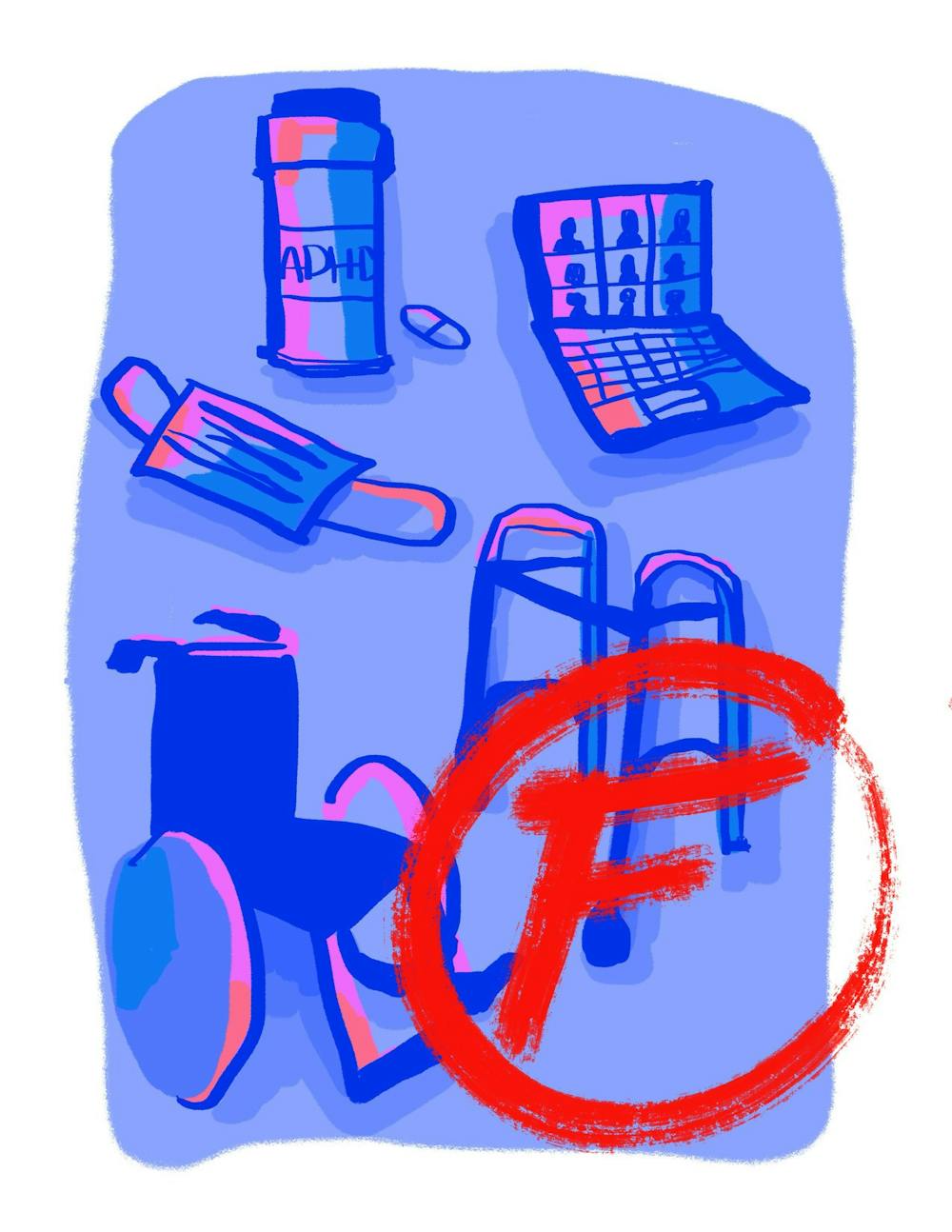Disability report ranks Rice 35th

Andrea Gomez, Chloe Chan / Thresher
A disability ranking study placed Rice as 35th in the country out of 106 universities studied for disability inclusion and access in higher education.
Created by Bowen Cho, a disability scholar-activist at the Paul K. Longmore Institute on Disability at San Francisco State University, this project ranked top universities on four pillars. In Cho’s ranking system, no school scored better than a D. The top-ranked schools in the project were Yale University, Harvard University and the University of Idaho.
The first pillar, support and accessibility, measured metrics such as building accessibility, time between classes, counseling services and remote accessibility. In their report, Cho wrote that a 10-minute transfer period between classes, which Rice currently employs, can cause issues for people with mobility-related disabilities. Another facet of support and accessibility is the time for an initial counseling session, which according to Cho can take weeks at some universities.
The second pillar is inclusion, which was measured through the existence of mandatory diversity, equity and inclusion programs and the presence of peer support groups on campus. The third pillar is safety, measured by experiences of ableism, police response to crisis and students of concern reporting. The fourth pillar is critical pedagogy, measured by support for racial justice, disability studies programs, critical theory and ethical research.
“I designed the survey with four categories (pillars) of measurement to try to get a holistic picture of disability support in higher education, especially since support can mean vastly different things to different students,” Cho wrote in an email to the Thresher.
Instead of purely academic research, Cho said that the project was designed with lived experiences in mind.
“Lived experience research is particularly important in order to break a long and entrenched pattern of academicians and medical experts defining what quality of life means for disabled people, often ignoring or speaking over the voices of disabled people when we express our needs and identities in ways that don’t fit within a medical or pathologizing frame of disability,” Cho wrote.
Cho said the project was primarily based on publicly available data and survey responses, receiving one survey response from Rice.
“I am transparent about the limited resources I had to conduct this project, and I designed the survey in anticipation of receiving a small response rate,” Cho wrote. “The average response rate per university was three, and the median was two.”
Cho’s background in disability research includes Students of Concern research, which was included in the ranking system. Cho defines Students of Concern as a tool for surveying vulnerable students who are perceived as a threat to themselves or others.
Director of the Student Wellbeing Office Agnes Ho said that Students of Concern reporting is available for students and faculty to refer students to the wellbeing office if there are concerns about mental health.
“A Wellbeing Advisor will reach out to the student of concern [to] provide resources and connect them with support services,” Ho wrote in an email to the Thresher.
Cho says they include mental health under the lens of disability in their project to highlight the intersectionality of disability advocacy.
“I would say that it is disabling when a person’s needs aren’t being met, and because society is built around neurotypical and abled people’s needs, neurodivergence can indeed be disabling in that context,” Cho wrote.
President Reggie DesRoches said that Rice remains committed to disability accessibility and inclusion.
“Rice is committed to providing an accessible and inclusive educational and work environment to all students, faculty and staff. We work hard, especially through our Disabilities Resource Center, to address these priorities,” DesRoches wrote in an email to the Thresher.
“We are in the process of launching a self-review of our services to identify areas of future focus … Upon completion of our self-review of accessibility services, I expect new initiatives will be developed to prioritize enhancing our campus experience and accessibility,” DesRoches added.
Jeff Anderson, an administrative assistant at the Disabilities Resource Center, says that the DRC works to give students accommodations and make the campus an inclusive environment.
“Applications for accommodation are promptly reviewed when they arrive at the DRC,” Anderson wrote in an email to the Thresher. “Accommodations are [then] recommended to address the needs of the individual.”
According to Anderson, the DRC requires documentation provided by a credentialed professional of a diagnosis, a description of the limitation and the accommodation to address the limitation.
Ling DeBellis, an advisor for the Student Association’s Students with Disabilities Committee, said that the DRC primarily relies on student self-advocacy for accommodations.
“You have to get a physician’s approval, you have to submit documentation. That can take a long time. It makes students really anxious. If you need accommodations now, it’s always a hassle,” DeBellis said.
DeBellis, a doctoral student, said that a new disability online portal would offer students a single location for disability related documentation and information, but it was met with some controversy.
“There was a debate on whether students should be able to have the system portal directly send the letters on behalf of the student to professors,” DeBellis said.
According to DeBellis, the DRC is understaffed, which can occasionally lead to issues for students seeking accommodations. The DRC did not respond to a question about staffing in time for publication.
“Delays may occur if insufficient documentation is received. The documentation is reviewed and if more documentation is needed the DRC contacts the student or staff member. The student or staff member is notified of the approval if the documentation is sufficient,” Anderson said.
DeBellis said that accommodations, while being generally respected by faculty, can lead to logistical issues.
“What we can tell is that a lot of our peer institutions have a designated testing center,” DeBellis said, run by disability programs where students with accommodations can take exams. “[Faculty at Rice] don’t have a problem giving accommodations. Their stress is that they have to find an extra room. Or, ‘When am I going to give them a double time exam?’”
Lindsey Vongthavaravat, the director of the SA Students with Disabilities Committee, said the committee is also working on a program to support new students with the accommodations process.
“Currently we are working on a disability omnibud project at Will Rice [College]. That project aims to provide peer mentorship where upperclassmen can give aid to entering freshmen,” Vongthavaravat, a Will Rice sophomore, said.
Cho says that while accommodations are a first step for disability inclusion, much work is to be done to dismantle the systems that subjugate disability. They said this is the reason they view disability advocacy with an intersectional approach.
“It’s important to acknowledge how discrimination can be compounded for people with multiple marginalized identities, including disability and race,” Cho wrote. “Capitalism provides the motivation for institutions like academia, which functions largely these days to prepare students to enter the corporate workforce with large amounts of debt, to view disability, and anyone generally who is less productive, as a liability and burden.”
More from The Rice Thresher

Rice loses to UH in Bayou Bucket Classic
The Bayou Bucket will remain with the University of Houston until at least 2030 after Rice football lost to the Cougars Saturday.

Moody Center’s new exhibit blurs the line between body and machine
Swelling latex sculptures, inspired by placentas and umbilical cords have taken up residence in the Moody Center for the Arts. The Barcelona-based artist Eva Fàbregas describes her pieces as forms that grow from “the guts of the architecture,” inflating and wrinkling as if they were alive.

Fizz users and moderators talk fame, challenges
During the volleyball team’s face-off against the University of Texas at Austin on Sept. 3, Jack Vu decided to have a little fun with the scoreboard. An anonymous poster had inaccurately mentioned that Rice beat UT on Fizz, so Vu decided to join in.

Please note All comments are eligible for publication by The Rice Thresher.